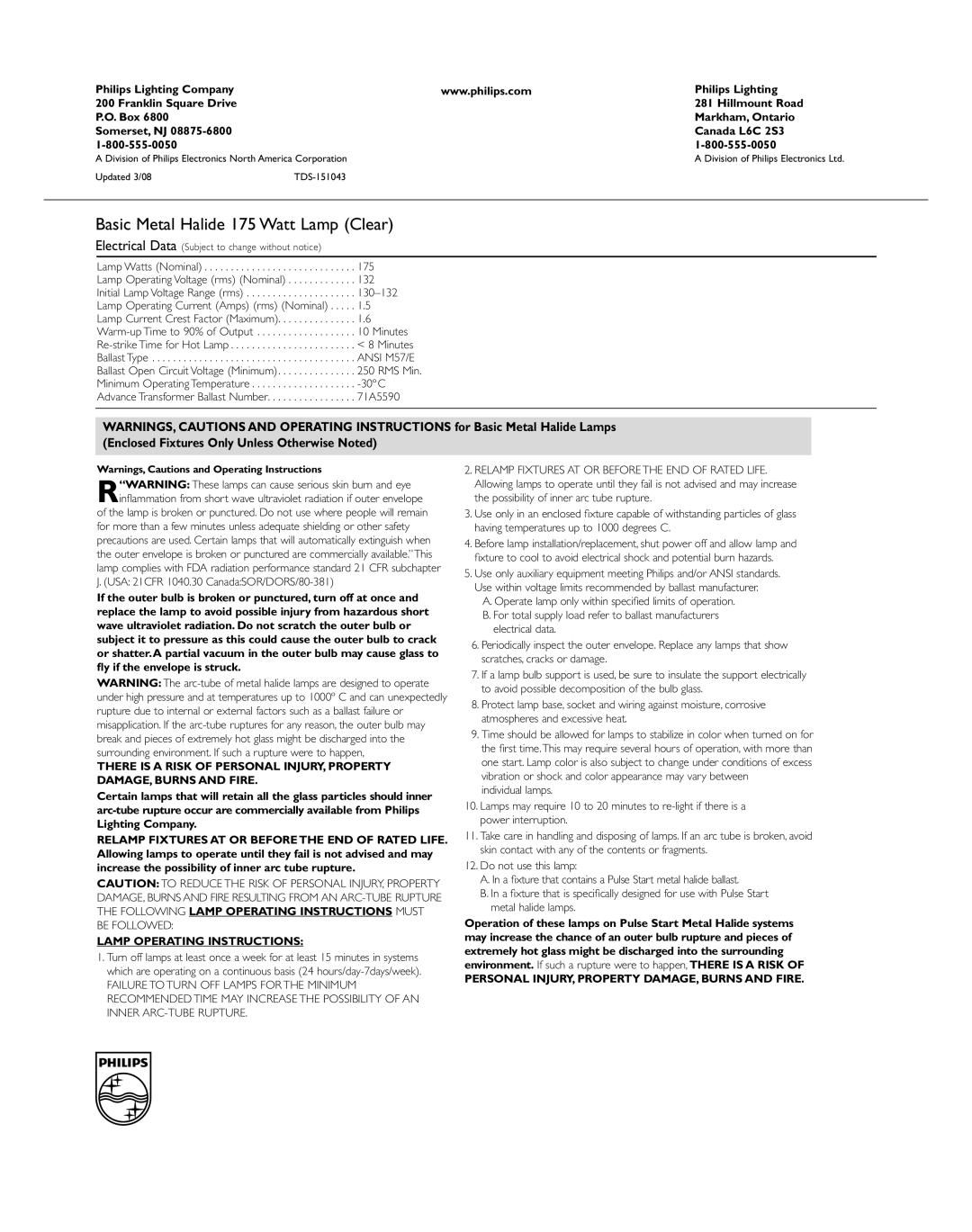
Philips Lighting Company | www.philips.com | Philips Lighting |
200 Franklin Square Drive |
| 281 Hillmount Road |
P.O.Box 6800 |
| Markham, Ontario |
Somerset, NJ |
| Canada L6C 2S3 |
| ||
A Division of Philips Electronics North America Corporation | A Division of Philips Electronics Ltd. | |
Updated 3/08 |
| |
Basic Metal Halide 175 Watt Lamp (Clear)
Electrical Data (Subject to change without notice)
Lamp Watts (Nominal) . . . . . . . . . . . . . . . . . . . . . . . . . . . . . 175
Lamp Operating Voltage (rms) (Nominal) . . . . . . . . . . . . . 132
Initial Lamp Voltage Range (rms) . . . . . . . . . . . . . . . . . . . . .
Lamp Operating Current (Amps) (rms) (Nominal) . . . . . 1.5
Lamp Current Crest Factor (Maximum). . . . . . . . . . . . . . . 1.6
Ballast Type . . . . . . . . . . . . . . . . . . . . . . . . . . . . . . . . . . . . . . . ANSI M57/E
Ballast Open Circuit Voltage (Minimum). . . . . . . . . . . . . . . 250 RMS Min.
Minimum Operating Temperature . . . . . . . . . . . . . . . . . . . .
Advance Transformer Ballast Number. . . . . . . . . . . . . . . . . 71A5590
WARNINGS, CAUTIONS AND OPERATING INSTRUCTIONS for Basic Metal Halide Lamps (Enclosed Fixtures Only Unless Otherwise Noted)
Warnings, Cautions and Operating Instructions
R“WARNING:These lamps can cause serious skin burn and eye inflammation from short wave ultraviolet radiation if outer envelope
of the lamp is broken or punctured. Do not use where people will remain for more than a few minutes unless adequate shielding or other safety precautions are used. Certain lamps that will automatically extinguish when the outer envelope is broken or punctured are commercially available.”This lamp complies with FDA radiation performance standard 21 CFR subchapter J. (USA: 21CFR 1040.30
If the outer bulb is broken or punctured,turn off at once and replace the lamp to avoid possible injury from hazardous short wave ultravioletradiation.Do not scratch the outer bulb or subject it to pressure as this could cause the outer bulb to crack or shatter.A partial vacuum in the outer bulb may cause glass to fly if the envelope is struck.
WARNING:The
THERE IS A RISK OF PERSONAL INJURY,PROPERTY DAMAGE,BURNSAND FIRE.
Certain lamps that will retain all the glass particles shouldinner
RELAMP FIXTURESAT OR BEFORETHE END OF RATEDLIFE. Allowing lamps to operate until they fail is not advised and may increase the possibility of inner arc tube rupture.
CAUTION: TO REDUCE THE RISK OF PERSONAL INJURY,PROPERTY DAMAGE,BURNSAND FIRE RESULTINGFROM AN
LAMP OPERATINGINSTRUCTIONS:
1.Turn off lamps at least once a week for at least 15 minutes in systems which are operating on a continuous basis (24
FAILURETOTURN OFF LAMPS FOR THE MINIMUM RECOMMENDED TIME MAY INCREASE THE POSSIBILITY OF AN INNER
2.RELAMP FIXTURES AT OR BEFORETHE END OF RATED LIFE. Allowing lamps to operate until they fail is not advised and may increase the possibility of inner arc tube rupture.
3.Use only in an enclosed fixture capable of withstanding particles of glass having temperatures up to 1000 degrees C.
4.Before lamp installation/replacement,shut power off and allow lamp and fixture to cool to avoid electrical shock and potential burn hazards.
5.Use only auxiliary equipment meeting Philips and/or ANSI standards. Use within voltage limits recommended by ballast manufacturer.
A.Operate lamp only within specified limits of operation.
B.For total supply load refer to ballast manufacturers electrical data.
6.Periodically inspect the outer envelope. Replace any lamps that show scratches, cracks or damage.
7.If a lamp bulb support is used, be sure to insulate the support electrically to avoid possible decomposition of the bulb glass.
8.Protect lamp base, socket and wiring against moisture, corrosive atmospheres and excessive heat.
9.Time should be allowed for lamps to stabilize in color when turned on for the first time.This may require several hours of operation, with more than one start. Lamp color is also subject to change under conditions of excess vibration or shock and color appearance may vary between
individual lamps.
10.Lamps may require 10 to 20 minutes to
11.Takecare in handling and disposing of lamps. If an arc tube is broken, avoid skin contact with any of the contents or fragments.
12.Do not use this lamp:
A.In a fixture that containsa Pulse Start metal halide ballast.
B.In a fixture that is specifically designed for use with Pulse Start metal halide lamps.
Operation of these lamps on Pulse Start Metal Halide systems may increasethe chance of an outer bulb ruptureand pieces of extremelyhot glass might be dischargedinto the surrounding environment.If such a rupture were to happen,THERE IS A RISK OF
